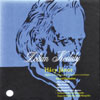Kodály Harý János
Depardieu’s a delight but it’s hard to get wild about this Háry
View record and artist detailsRecord and Artist Details
Composer or Director: Zoltán Kodály
Genre:
Opera
Label: Accord
Magazine Review Date: 4/2006
Media Format: CD or Download
Media Runtime: 119
Mastering:
Stereo
DDD
Catalogue Number: 476 8474

Tracks:
| Composition | Artist Credit |
|---|---|
| Háry János |
Zoltán Kodály, Composer
Béla Perencz, Háry János, Tenor Erik Freulon, Napoleon Friedemann Layer, Conductor István Rozsos, Marci, Tenor Lucia Megyesi Schwartz, Marie-Louise Montpellier National Orchestra Montpellier Opera Chorus Nora Gubisch, Orzse, Soprano Zita Váradi, Empress Zoltán Kodály, Composer |
Author: Edward Greenfield
The great merit of this live version of Kodály’s folk-opera Háry János is that it offers the score absolutely complete. It also has the outstandingly characterful Gérard Depardieu as Háry, telling the story and linking the musical items in conversation with an unnamed student. That should be ample reason for a recommendation, particularly for those fluent in French; sadly, there are important snags.
Firstly, however effective the stage presentation, the inclusion of so much dialogue does make the entertainment painfully slow at times, not least at the start of the first and third of the four sections. The overture alone lasts 20 minutes, and the opening of Part 3 has very little musical interest to set against the huge stretches of dialogue. To make matters worse, the recording does not have the dialogue on separate tracks, making it difficult to programme out. Secondly, the live recording is variable, with some odd balances. The choral sections are murky and distant at times, and coughing and other audience noises intrude. The analogue sound of the 1982 Hungaroton version with János Ferencsik is far fuller and more immediate, and the performance is more fiery, as one might expect from an all-Hungarian cast under a Hungarian conductor. Not that the sets are directly comparable, for the latter has no linking narration or dialogue, and following a Hungarian theatrical tradition the Part 2 number ‘Lucifer’ is missing. Thirdly, and perhaps most seriously, the singing Háry is miscast. Baritone Béla Perencz sounds wobbly and strained and, in total contrast with Depardieu as his speaking counterpart, his singing has no character. Contrast him with István Rozsos in the small role of Marci, whose drinking song has just the sort of sparkle one wants. As the heroine – Ilka instead of the usual Orzse – Nora Gubisch, with her fruity mezzo, is warm and characterful enough but comes nowhere near to matching Klára Takács on Hungaroton. The rest of the cast are acceptable. Conductor Friedemann Layer draws fresh, clean performances from his orchestra, even if they rarely match the fire of Ferencsik’s account.
A limited recommendation then. The obvious warning is that the Háry János Suite contains virtually all the musical plums, making one dissatisfied that the complete opera has so little extra in striking music. We need the return of the classic Decca version of the opera, with István Kertész conducting the LSO and narrator Peter Ustinov providing a whole gallery of grotesques. Kertész even has the extra ‘Lucifer’ movement, though he omits two numbers at the start of Part 3.
Firstly, however effective the stage presentation, the inclusion of so much dialogue does make the entertainment painfully slow at times, not least at the start of the first and third of the four sections. The overture alone lasts 20 minutes, and the opening of Part 3 has very little musical interest to set against the huge stretches of dialogue. To make matters worse, the recording does not have the dialogue on separate tracks, making it difficult to programme out. Secondly, the live recording is variable, with some odd balances. The choral sections are murky and distant at times, and coughing and other audience noises intrude. The analogue sound of the 1982 Hungaroton version with János Ferencsik is far fuller and more immediate, and the performance is more fiery, as one might expect from an all-Hungarian cast under a Hungarian conductor. Not that the sets are directly comparable, for the latter has no linking narration or dialogue, and following a Hungarian theatrical tradition the Part 2 number ‘Lucifer’ is missing. Thirdly, and perhaps most seriously, the singing Háry is miscast. Baritone Béla Perencz sounds wobbly and strained and, in total contrast with Depardieu as his speaking counterpart, his singing has no character. Contrast him with István Rozsos in the small role of Marci, whose drinking song has just the sort of sparkle one wants. As the heroine – Ilka instead of the usual Orzse – Nora Gubisch, with her fruity mezzo, is warm and characterful enough but comes nowhere near to matching Klára Takács on Hungaroton. The rest of the cast are acceptable. Conductor Friedemann Layer draws fresh, clean performances from his orchestra, even if they rarely match the fire of Ferencsik’s account.
A limited recommendation then. The obvious warning is that the Háry János Suite contains virtually all the musical plums, making one dissatisfied that the complete opera has so little extra in striking music. We need the return of the classic Decca version of the opera, with István Kertész conducting the LSO and narrator Peter Ustinov providing a whole gallery of grotesques. Kertész even has the extra ‘Lucifer’ movement, though he omits two numbers at the start of Part 3.
Discover the world's largest classical music catalogue with Presto Music.

Gramophone Digital Club
- Digital Edition
- Digital Archive
- Reviews Database
- Full website access
From £8.75 / month
Subscribe
Gramophone Full Club
- Print Edition
- Digital Edition
- Digital Archive
- Reviews Database
- Full website access
From £11.00 / month
Subscribe
If you are a library, university or other organisation that would be interested in an institutional subscription to Gramophone please click here for further information.




